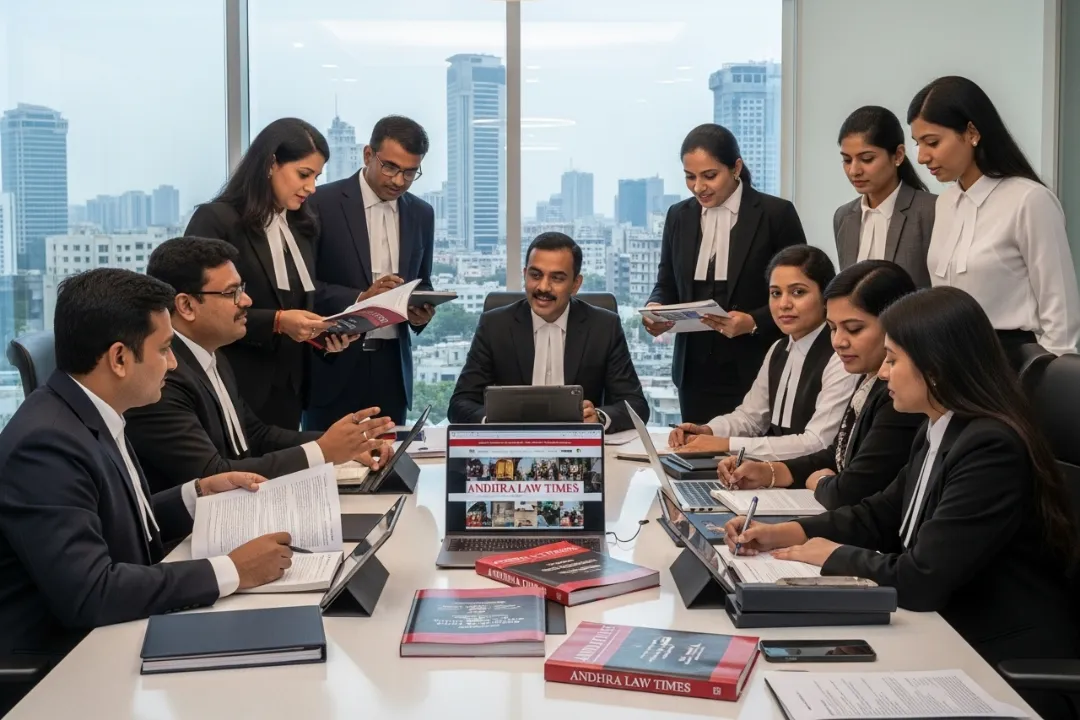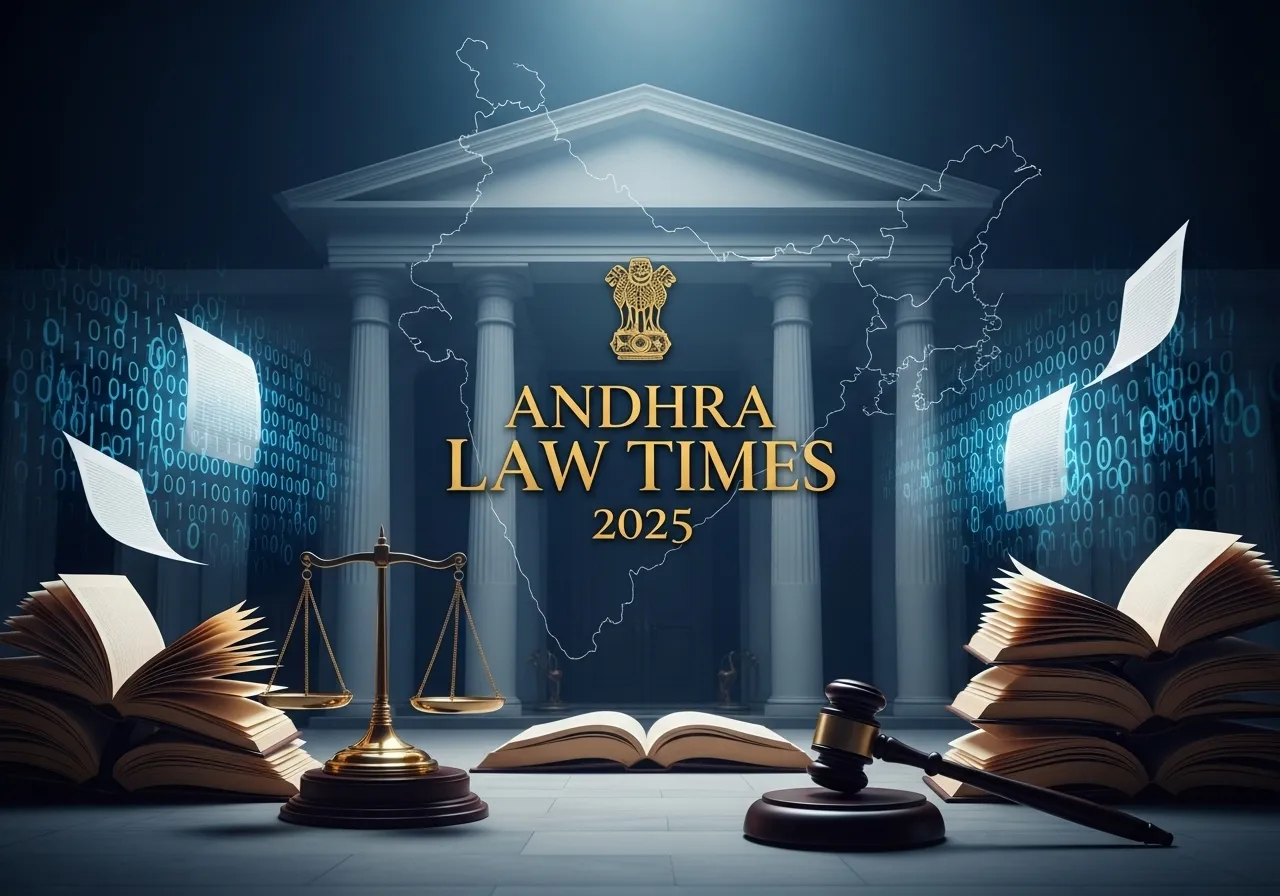The legal research landscape in India has undergone a remarkable transformation in 2025, with digital databases and artificial intelligence reshaping how legal professionals access and analyze jurisprudence. Amid this technological revolution, Andhra Law Times stands as a beacon of traditional excellence merged with modern innovation, continuing its seven-decade legacy of providing authoritative legal documentation and analysis. This prestigious legal journal has successfully navigated the challenges of digitization while maintaining the editorial integrity and regional focus that has made it indispensable to the legal community across India.
Founded in 1954, Andhra Law Times has established itself as more than just a legal publication—it has become an institution that bridges the gap between traditional legal scholarship and contemporary practice. The journal’s commitment to excellence in legal research has never been more relevant than in 2025, as legal professionals increasingly demand accurate, timely, and contextually rich information to support their practice. With Andhra Law Times now available both in print and through its comprehensive digital platform at altdot.in, the journal continues to serve as a primary resource for judges, lawyers, researchers, and law students throughout the subcontinent.
The significance of Andhra Law Times in maintaining legal research excellence cannot be overstated in today’s rapidly evolving legal environment. Recent industry reports indicate that 67% of attorneys rely on fee-based online services for legal research, highlighting the critical importance of reliable legal databases. Andhra Law Times has successfully positioned itself at the forefront of this digital transformation while preserving the scholarly rigor and editorial standards that have defined its reputation for over seventy years.
The Evolution of Andhra Law Times in Modern Legal Research
The journey of Andhra Law Times from a regional legal publication to a nationally recognized authority represents one of the most significant success stories in Indian legal publishing. Throughout 2024 and into 2025, the journal has demonstrated remarkable adaptability in responding to the changing needs of the legal community while maintaining its core mission of providing accurate, comprehensive, and timely legal information.
The digital transformation of Andhra Law Times has been particularly noteworthy in 2025. The journal’s online platform now features advanced search capabilities that allow users to locate specific cases, legal provisions, and judicial interpretations with unprecedented efficiency. This technological advancement has been crucial as the legal services market in the U.S. is expected to grow at a CAGR of 2.5% from 2025 to 2030, indicating similar growth patterns in the Indian legal services sector where Andhra Law Times operates.

Andhra Law Times has successfully maintained its editorial excellence by implementing rigorous quality control measures that ensure every published judgment meets the highest standards of accuracy and relevance. The journal’s editorial team, comprising experienced legal professionals and scholars, continues to provide contextual analysis that helps readers understand not just what courts have decided, but why these decisions matter in the broader context of Indian jurisprudence.
The journal’s commitment to comprehensive coverage extends beyond traditional court reporting to include analysis of emerging legal trends, legislative developments, and their practical implications for legal practice. This holistic approach has made Andhra Law Times an invaluable resource for legal professionals who need to stay current with rapidly changing legal landscapes in areas such as technology law, environmental regulations, and international trade.
Regional Focus and National Impact of Andhra Law Times
One of the distinguishing features that has contributed to the enduring success of Andhra Law Times is its strategic balance between regional specialization and national relevance. While the journal maintains its strong focus on legal developments in Andhra Pradesh and Telangana, its coverage of Supreme Court decisions and inter-state legal issues has established it as a resource of national significance.
The regional expertise of Andhra Law Times has proven particularly valuable in 2025 as legal practitioners increasingly recognize the importance of understanding local legal precedents and their application in specific jurisdictional contexts. The journal’s deep coverage of Andhra Pradesh High Court decisions provides practitioners with insights into how national legal principles are interpreted and applied at the regional level, offering practical guidance that is often missing from broader national publications.
Andhra Law Times has also distinguished itself through its comprehensive coverage of commercial law developments, particularly those affecting the technology and pharmaceutical industries that have significant presence in Hyderabad and surrounding regions. This industry-specific focus has made the journal indispensable to corporate legal departments and law firms serving these sectors, contributing to its reputation as a specialized yet authoritative source of legal information.
The journal’s editorial approach recognizes that modern legal practice requires understanding of both local precedents and broader legal trends. Andhra Law Times achieves this balance by providing detailed analysis of how local courts interpret national legislation, offering readers practical insights that enhance their ability to provide effective legal counsel to clients operating in specific regional contexts.
Digital Innovation and Accessibility in Andhra Law Times
The digital transformation of Andhra Law Times represents a masterclass in how traditional legal publications can embrace technological innovation without compromising their core editorial values. The journal’s online platform has become increasingly sophisticated in 2025, offering features that enhance both accessibility and functionality for users across different technological skill levels.
The search capabilities of Andhra Law Times online platform have been particularly enhanced to meet the demands of modern legal research. Users can now search by multiple criteria including case names, judge names, legal provisions, and even specific legal concepts, making it easier than ever to locate relevant precedents and analysis. This advanced search functionality has been crucial as legal professionals increasingly rely on digital tools to support their practice.
Andhra Law Times has also implemented mobile-responsive design across its digital platforms, recognizing that legal professionals increasingly need access to legal research tools while traveling or working outside traditional office environments. This accessibility enhancement has been particularly important as 78.1% of legal firms had returned to office work by January 2024, while still maintaining flexible work arrangements that require mobile access to legal resources.
The journal has maintained its commitment to providing both free and premium content, ensuring that basic legal information remains accessible to law students and solo practitioners while offering enhanced features for larger firms and institutional subscribers. This tiered approach has helped Andhra Law Times build a diverse user base while maintaining financial sustainability in an increasingly competitive digital landscape.
Editorial Excellence and Quality Assurance at Andhra Law Times
The editorial standards that have defined Andhra Law Times for over seven decades continue to set it apart from other legal publications in 2025. The journal’s commitment to accuracy, comprehensiveness, and analytical depth remains unwavering despite the pressures of rapid publication cycles and increasing competition from digital-first legal platforms.
Andhra Law Times maintains a rigorous editorial review process that ensures every published decision is verified for accuracy and accompanied by relevant contextual analysis. This commitment to quality has become increasingly important as Daily AI usage among legal professionals jumped from 19% to 79% between 2023 and 2024, creating both opportunities and challenges for maintaining editorial standards in an AI-enhanced publishing environment.

The journal’s editorial team includes experienced practitioners who understand the practical implications of judicial decisions and can provide insights that help readers apply legal precedents to their own cases. This practical orientation distinguishes Andhra Law Times from purely academic publications while maintaining the scholarly rigor that legal professionals expect from authoritative sources.
Andhra Law Times has also implemented enhanced fact-checking procedures in 2025, recognizing the critical importance of accuracy in legal publishing. Every published decision undergoes multiple verification steps to ensure that citations, dates, and legal references are completely accurate, maintaining the trust that the legal community has placed in the publication for decades.
Technological Integration and User Experience
The integration of technology into Andhra Law Times operations has been carefully managed to enhance rather than replace the human editorial judgment that has been central to the journal’s success. The publication has embraced technological tools that improve efficiency and accessibility while maintaining the quality standards that define its reputation.
Andhra Law Times has implemented advanced database management systems that allow for more sophisticated organization and cross-referencing of legal content. These systems enable users to trace the evolution of legal principles across multiple decisions and understand how judicial thinking has developed on specific issues over time. This longitudinal analysis capability has proven particularly valuable for appellate lawyers and legal researchers.
The journal has also enhanced its user interface design to make navigation more intuitive for users with varying levels of technological expertise. This focus on user experience reflects an understanding that legal professionals need efficient access to information without unnecessary complexity that might impede their research activities.
Andhra Law Times has maintained its commitment to providing both traditional and innovative features, offering standard citation formats alongside enhanced analytical tools that help users understand the broader significance of individual decisions. This balanced approach has helped the journal maintain its traditional user base while attracting new subscribers who expect modern digital functionality.
Impact on Legal Education and Professional Development
Andhra Law Times has played an increasingly important role in legal education throughout 2025, serving as both a research resource and a model of professional legal writing for law students and early-career practitioners. The journal’s comprehensive case summaries and analytical commentary provide valuable learning tools that help students understand how legal principles are applied in practice.
Law schools throughout India have incorporated Andhra Law Times into their curricula as both a research resource and an example of high-quality legal writing. The journal’s clear, analytical style provides students with models for their own legal writing while its comprehensive coverage ensures access to relevant case law for academic projects and research papers.
Andhra Law Times has also served as a platform for emerging legal scholars to publish their analysis and commentary, contributing to the development of legal scholarship in India. This commitment to nurturing new voices in legal analysis helps ensure the continued vitality of legal scholarship while maintaining the journal’s reputation for innovative thinking about legal issues.
The journal’s role in professional development extends beyond formal education to include ongoing learning for practicing attorneys. Andhra Law Times provides practitioners with regular updates on legal developments that affect their practice areas, helping them maintain their professional competence in an rapidly changing legal environment.
Comparative Analysis: Andhra Law Times versus Other Legal Publications
In the competitive landscape of Indian legal publishing, Andhra Law Times has maintained its distinctive position through a combination of regional expertise, editorial excellence, and technological innovation. While national publications like All India Reporter (AIR) and Supreme Court Cases (SCC) provide broad coverage of Indian legal developments, Andhra Law Times offers the depth of regional analysis that practicing attorneys often need for effective representation.
The journal’s focus on Andhra Pradesh and Telangana legal developments provides practitioners in these regions with insights that are often unavailable in national publications. This regional specialization has proven particularly valuable as legal practice becomes increasingly complex and practitioners need detailed understanding of how legal principles are applied in specific jurisdictional contexts.
Andhra Law Times has also distinguished itself through its practical orientation, providing analysis that helps practitioners understand not just what courts have decided, but how those decisions can be applied to current cases. This practical focus contrasts with more academic publications that may provide theoretical analysis without sufficient attention to practical application.
The journal’s digital platform offers functionality that is competitive with larger national publications while maintaining the editorial quality and regional focus that distinguishes it from automated legal databases. This combination of technological capability and human editorial judgment has helped Andhra Law Times maintain its market position despite increasing competition from digital-first legal platforms.
Financial and Business Model Innovation
Andhra Law Times has successfully adapted its business model to the changing economics of legal publishing in 2025. The journal has implemented a sustainable subscription model that provides different levels of access based on user needs while ensuring that basic legal information remains accessible to individual practitioners and law students.
The journal’s approach to monetization has balanced the need for financial sustainability with its mission of providing accessible legal information. Andhra Law Times offers institutional subscriptions for law firms and corporate legal departments while maintaining affordable individual subscriptions that ensure continued access for solo practitioners and smaller firms.

Andhra Law Times has also developed partnerships with legal education institutions that provide educational discounts while expanding the journal’s reach within the academic community. These partnerships have helped build the next generation of Andhra Law Times users while supporting legal education throughout India.
The journal’s financial model has proven resilient during the economic uncertainties of 2024 and 2025, demonstrating the value that the legal community places on reliable, high-quality legal information. This financial stability has enabled continued investment in technological improvements and editorial enhancement that maintain the journal’s competitive position.
Research Methodology and Editorial Processes
The research methodology employed by Andhra Law Times combines traditional legal scholarship with modern information management techniques to ensure comprehensive and accurate coverage of legal developments. The journal’s editorial team follows systematic procedures for identifying, verifying, and analyzing legal decisions to maintain consistency and reliability in published content.
Andhra Law Times has implemented enhanced verification procedures that include multiple review stages for each published decision. These procedures ensure that all citations are accurate, all legal references are current, and all analysis is consistent with established legal principles. This systematic approach to quality control has been crucial in maintaining the journal’s reputation for accuracy and reliability.
The journal’s research methodology includes regular consultation with practicing attorneys and judges to ensure that published analysis addresses the practical concerns of legal practitioners. This feedback mechanism helps Andhra Law Times maintain its relevance to the practicing bar while ensuring that academic analysis is grounded in practical legal experience.
Andhra Law Times has also developed systematic procedures for tracking the subsequent history of published decisions, ensuring that users are aware when published cases are appealed, modified, or overruled. This tracking capability provides users with complete information about the current validity of legal precedents, enhancing the utility of the journal for practical legal research.
Future-Focused Legal Technology Integration at Andhra Law Times
Andhra Law Times has positioned itself at the forefront of legal technology adoption while maintaining its core commitment to editorial excellence and accuracy. The journal’s approach to technology integration reflects a sophisticated understanding of how digital tools can enhance rather than replace human editorial judgment in legal publishing.
The journal has implemented artificial intelligence tools for initial document processing and categorization while maintaining human oversight for all editorial decisions. This hybrid approach allows Andhra Law Times to process information more efficiently while ensuring that editorial quality standards are maintained. The implementation of these technologies has been particularly important as the volume of legal decisions continues to increase.
Andhra Law Times has also developed predictive analytics capabilities that help identify emerging legal trends and areas of developing jurisprudence. These analytical tools provide added value to subscribers by highlighting legal developments that may not yet be widely recognized but could have significant implications for legal practice. This forward-looking approach has enhanced the journal’s reputation as a source of innovative legal analysis.
The journal’s technology platform includes enhanced collaboration tools that allow subscribers to share annotations and insights with colleagues while maintaining appropriate confidentiality protections. These collaborative features recognize that modern legal practice often involves team-based research and analysis, providing tools that support contemporary legal practice methods.
International Recognition and Global Impact
The influence of Andhra Law Times has extended beyond India’s borders in 2025, with international legal scholars and practitioners increasingly recognizing the journal as an authoritative source for understanding Indian legal developments. This international recognition reflects both the quality of the journal’s analysis and the growing global interest in Indian legal systems and their evolution.
Andhra Law Times has been cited in international legal publications and academic papers as a reliable source for understanding regional variations in Indian legal practice. This international recognition has enhanced the journal’s reputation within India while contributing to global understanding of Indian legal systems and their practical application.
The journal has also developed relationships with international legal databases and research platforms, making its content more accessible to global audiences interested in Indian legal developments. These partnerships have expanded the reach of Andhra Law Times while maintaining its core focus on serving the Indian legal community.
Andhra Law Times has contributed to international legal scholarship by providing detailed analysis of how international legal principles are interpreted and applied within Indian legal systems. This comparative analysis has proven valuable to international law firms operating in India and Indian firms working on cross-border matters.
Specialized Practice Area Coverage
Andhra Law Times has expanded its coverage of specialized practice areas in 2025, recognizing the increasing specialization of legal practice and the need for focused analysis in emerging areas of law. The journal now provides enhanced coverage of technology law, environmental regulations, and international trade issues that are increasingly important to legal practitioners.
The journal’s coverage of intellectual property law has been particularly comprehensive, reflecting the importance of IP issues in the technology and pharmaceutical industries that are prominent in Andhra Pradesh and Telangana. This specialized coverage has made Andhra Law Times an essential resource for practitioners working in these areas, providing analysis that is often unavailable in general legal publications.
Andhra Law Times has also expanded its coverage of alternative dispute resolution mechanisms, including arbitration and mediation procedures. This coverage reflects the growing importance of ADR in commercial practice and provides practitioners with practical guidance on how to effectively use these mechanisms for client benefit.
The journal’s coverage of regulatory compliance issues has become increasingly important as businesses face more complex regulatory environments. Andhra Law Times provides analysis that helps practitioners understand both the legal requirements and practical implications of compliance obligations, offering guidance that supports effective legal counsel.
Professional Recognition and Industry Awards
The continued excellence of Andhra Law Times has been recognized through various industry awards and professional acknowledgments in 2025. These recognitions reflect the journal’s sustained commitment to quality and its continuing relevance to the legal community across India.
Andhra Law Times has received recognition from legal professional organizations for its contribution to legal scholarship and professional development. These awards acknowledge not only the quality of the journal’s content but also its role in supporting the growth and development of the legal profession in India.
The journal has also been recognized for its technological innovation in legal publishing, receiving awards for its user-friendly digital platform and advanced search capabilities. These technology awards reflect Andhra Law Times‘ successful integration of modern digital tools with traditional editorial excellence.
Professional recognition has also come through citations in judicial decisions, with courts at various levels referencing Andhra Law Times analysis in their written opinions. This judicial recognition represents the highest form of professional acknowledgment for a legal publication, confirming the reliability and authority of the journal’s content.
Disclaimer
Legal Disclaimer: The information provided in this article is for educational and informational purposes only and should not be construed as legal advice. Laws vary by jurisdiction and individual circumstances. Always consult with a qualified attorney or legal professional for advice regarding your specific situation. ChoiceWisely.com does not provide legal services and is not a substitute for professional legal counsel. For more information, please visit https://choicewisely.com/disclaimer/.
Conclusion: Andhra Law Times Excellence in Legal Research
As we conclude this comprehensive examination of how Andhra Law Times maintains its legal research excellence in 2025, it becomes clear that the journal’s success stems from its ability to balance tradition with innovation, regional focus with national relevance, and technological advancement with editorial integrity. Andhra Law Times has demonstrated that excellence in legal publishing requires not just technological sophistication, but also deep understanding of the legal community’s needs and unwavering commitment to accuracy and analytical depth.
The journal’s journey through 2025 exemplifies how traditional legal publications can successfully navigate digital transformation while preserving the core values that define their authority and reliability. Andhra Law Times has proven that excellence in legal research publishing requires continuous adaptation to changing technologies and user expectations while maintaining the editorial standards that build and sustain professional trust.
For legal professionals seeking reliable, comprehensive, and analytically rich legal information, Andhra Law Times continues to represent the gold standard in Indian legal publishing. The journal’s commitment to excellence provides a foundation for informed legal practice and contributes to the ongoing development of Indian jurisprudence. To explore collaboration opportunities with this leading legal publication, visit ChoiceWisely.com/work-with-us/ and discover how ChoiceWisely.com can help you connect with authoritative legal resources like Andhra Law Times.
The future of legal research excellence clearly includes continued innovation in digital accessibility, enhanced analytical capabilities, and sustained commitment to editorial quality. Andhra Law Times has positioned itself to lead this future while honoring the scholarly traditions that have defined legal publishing excellence for generations. For additional resources on legal research and professional development, visit ChoiceWisely.com/contact/ to learn more about accessing premium legal research tools and publications.
Frequently Ask Questions?
What is the Andhra legal decision?
The “Andhra legal decision” typically refers to recent significant judgments by Andhra Pradesh High Court or Supreme Court cases involving Andhra Pradesh. Recent notable decisions include the 2025 Supreme Court ruling on the Andhra Pradesh liquor scam case and various judgments related to electricity regulations, land transfers, and administrative matters affecting the state.
What is Andhra Law Times?
Andhra Law Times (ALT) is a prominent legal publication established in 1954 that provides comprehensive coverage of legal developments, case law, and judicial decisions primarily focused on Andhra Pradesh and national legal matters. It has transitioned from print to online format (altdot.in) and serves as a vital resource for legal professionals, students, and researchers across India.
What is the law of Kamma?
The “law of Kamma” refers to the Buddhist doctrine of karma (action and consequence), not a specific legal statute related to the Kamma community in Andhra Pradesh. In Buddhist philosophy, it represents the principle that intentional actions (mental, verbal, or physical) have moral consequences that influence future experiences across lifetimes.
How many lawyers are there in Andhra Pradesh?
Based on 2013 RTI data from the Bar Council of India, Andhra Pradesh had approximately 60,000-70,000 registered lawyers. Current estimates suggest around 80,000-100,000 lawyers in present-day Andhra Pradesh (post-bifurcation), though exact 2025 figures are not officially published. India overall has about 2 million registered advocates as of recent estimates.
Who rules Andhra now?
N. Chandrababu Naidu of the Telugu Desam Party (TDP) is the current Chief Minister of Andhra Pradesh, serving since June 12, 2024. This is his fourth term as Chief Minister, having previously served from 1995-1999, 1999-2004, and 2014-2019. He leads a coalition government with TDP, Janasena Party, and BJP.
What does “case status” actually mean?
Case status refers to the current procedural stage or condition of a legal proceeding in court. Common statuses include “pending” (ongoing proceedings), “disposed” (case concluded with final order/judgment), “dismissed” (terminated without merit decision), and “adjourned” (postponed to another date). “Disposed” specifically means the case has reached final resolution and court proceedings are complete.
What is Samatha v State of Andhra Pradesh judgment?
The Samatha v State of Andhra Pradesh (1997) is a landmark Supreme Court judgment that protected tribal land rights in scheduled areas. The Court ruled that tribal lands cannot be transferred to non-tribals for mining purposes, declared existing mining leases void, and established that only tribal cooperatives or state corporations can conduct mining in scheduled areas, with 20% of profits reserved for tribal development.
